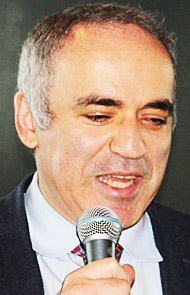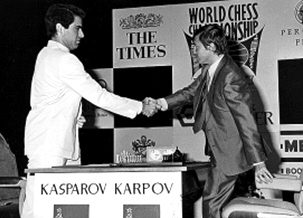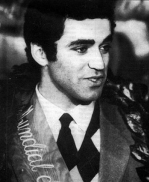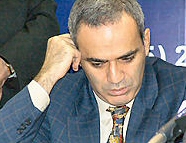Kasparov Garry Kimovich (13.04.1963)
 Russian Grandmaster (1980). Kasparov was the 13th World Champion 1985-2000, Champion of the USSR, Russia and the World Junior Champion 1980. He won the bronze medal at the World U16 Championships 1977 and has been rated as one of the world’s best players since 1985. He has also participated in eight Olympiads between 1980 and 2002 winning eight gold, two silver, and two bronze medals. Garry Kasparov was the winner of the Chess Oscar in 1982, 1983, 1985, 1986, 1987, 1988, 1995, 1996, 1999, 2001 and 2002. Kasparov, probably the best chess player of modern times, was born in Baku to a Jewish father and an Armenian mother.
Russian Grandmaster (1980). Kasparov was the 13th World Champion 1985-2000, Champion of the USSR, Russia and the World Junior Champion 1980. He won the bronze medal at the World U16 Championships 1977 and has been rated as one of the world’s best players since 1985. He has also participated in eight Olympiads between 1980 and 2002 winning eight gold, two silver, and two bronze medals. Garry Kasparov was the winner of the Chess Oscar in 1982, 1983, 1985, 1986, 1987, 1988, 1995, 1996, 1999, 2001 and 2002. Kasparov, probably the best chess player of modern times, was born in Baku to a Jewish father and an Armenian mother.
He is currently chairman of the Human Rights Foundation and chairs its International Council. In 2014, he obtained Croatian citizenship. He lives in New York City.
Kasparov, probably the best chess player of modern times, was born in Baku to a Jewish father and an Armenian mother. He learned to play chess when he was six years old and started his chess career under the name of his father, Harry Weinstein. Later on in 1975, after his father died, his name was Russianised to Garry Kasparov.
At the age of ten, he was already playing in junior tournaments and in 1973 was accepted into Mikhail Botvinnik’s chess school. Kasparov won his first major tournament in Riga 1976, finishing first in the USSR Junior Championship, and then repeated his victory the following year, conceding only one draw. He was then selected to participate in the World U16 where he finished third twice in 1976 and 1977. His performances were already attracting a lot of attention, including the Former World Champion Botvinnik, who stated that Kasparov was the greatest chess talent for the last decade including Karpov! In 1978, the fourteen-year-old Kasparov participated in the A. Sokolsky Memorial in Minsk and took the first place, exceeding the Soviet Master norm by 3½ points. Later he achieved the Master title. By winning all stages of qualification, he acceded to his first Soviet Championship (46th) and finished ninth out of eighteen with nine points, two points behind the winner, Mikhail Tal.
 In 1979 Kasparov was sent for his first international tournament in Yugoslavia. Unimpressed by top Grandmasters like Tigran Petrosian, Ulf Andersson, and Alexander Matanovic, he won Banja Luka two clear points ahead of Ulf Andersson, collecting his first GM norm at the same time. Finishing third-fourth at the 47th Soviet Championship the following year, Kasparov was selected for the national squad to play in European Team Championship. With the score of 5½:6 he was one of the best players.
In 1979 Kasparov was sent for his first international tournament in Yugoslavia. Unimpressed by top Grandmasters like Tigran Petrosian, Ulf Andersson, and Alexander Matanovic, he won Banja Luka two clear points ahead of Ulf Andersson, collecting his first GM norm at the same time. Finishing third-fourth at the 47th Soviet Championship the following year, Kasparov was selected for the national squad to play in European Team Championship. With the score of 5½:6 he was one of the best players.  In 1980 he became the World Junior Champion in Dortmund, ahead of Nigel Short, got the final norm and the FIDE title of Grandmaster that same year. Later he was invited to play board six for the Soviet team at the Olympiad in Malta. The gap between Kasparov and Karpov was gradually being reduced and in 1981 with more strong successes in the tournaments of Baku and Frunze and a second place in the Super Moscow Tournament, just behind Karpov with whom he drew, he topped Karpov for the first time on the FIDE ELO list. By winning more tournaments in 1982, like Bugojno and Moscow, Kasparov qualified for his first Interzonal, which he won +6=7 to qualify as a Candidate. Due to defeating Alexander Beliavsky +4-4-1, then Viktor Korchnoi +4=6-1 and finally Vassily Smyslov +4=9, Kasparov finally achieved his dream which was to play and become the World Champion. The first Match with Karpov in 1984 was one of the most controversial episodes in the history of chess. After being down +5=26 Kasparov won his first game and came back to +5=40-3 when the FIDE President Florencio Campomanes decided to stop the match. He replayed a scheduled match with Anatoly Karpov in 1985 and this time won the contest +5=15-3 becoming the 13th World Champion. In 1986, he defended his title successfully +5=14-4 in the return match, which took place in London and Leningrad. Kasparov found time outside of the world championship cycle to practice and he won two major tournaments in Brussels: Ohra 1986 and Swift 1987. The fourth match that Kasparov played against Karpov was in Seville Spain and ended with a draw +4=16-4. Being the World Champion and the best world player, Kasparov won all the strongest international events he participated in like Amsterdam 1988, Belfort 1988, USSR 1988 and Reykjavik 1988. After all these results, his rating crossed the incredible border of 2800. Kasparov became the organizer and first president of the International Grandmasters Association. He won the first tournament of World Cup in 1988-89 with success in Barcelona 1989, Skelleftea 1989 and Belgrad 1989. He also collected victories in Linares and Tilburg. At the end of 1990, he organized the 35th match for the World Champion title, which was another Kasparov versus Karpov match, in New York and Lyon. By winning this match +4=17-3, Kasparov saved his crown for another three years. He continued with victories in Paris, Linares, and Dortmund and then announced his breakaway from FIDE in March 1993, just before another victory in Linares. Financed by Intel and under the label of his new organization, the Professional Chess Association, he beat Nigel Short +6-1=13 in another World Championship match, which will never be recognized by FIDE. Kasparov continued being a superior player by winning in Amsterdam and Horgen 1994, Riga, Novgorod, the New York Rapid and the Paris Rapid in 1995. The same year, in New York, he played another World Championship match still sponsored by Intel and outside of FIDE and he also beat Viswanathan Anand 11:8, a genius player from India. Over the next nine years, his results remained similar; he came first at Geneva Rapid Chess and had a victory in probably the strongest ever tournament organized in Las Palmas 1996. He won in Linares, Novgorod and Tilburg 1997; Wijk aan Zee, Linares, Sarajevo and Frankfurt 1999; Wijk aan Zee and Linares 2000, where he shared first place with Vladimir Kramnik, and he won in Sarajevo. Kasparov invited Kramnik for the Braingame World Championship and then lost his “title” to his young opponent, who was once his pupil. In 2001 Kasparov broke another record by winning the Dutch tournament of Wijk and Zee three times in a row. He also won Linares 2001, World Cup Rapid at Cannes 2001, Astana Super GM 2001, Linares 2002, Moscow Rapid FIDE Grand Prix 2002 and the 57th Russian Championship 2004. Influenced by the World Champion Alexander Alekhine, Kasparov is a very well prepared modern player.
In 1980 he became the World Junior Champion in Dortmund, ahead of Nigel Short, got the final norm and the FIDE title of Grandmaster that same year. Later he was invited to play board six for the Soviet team at the Olympiad in Malta. The gap between Kasparov and Karpov was gradually being reduced and in 1981 with more strong successes in the tournaments of Baku and Frunze and a second place in the Super Moscow Tournament, just behind Karpov with whom he drew, he topped Karpov for the first time on the FIDE ELO list. By winning more tournaments in 1982, like Bugojno and Moscow, Kasparov qualified for his first Interzonal, which he won +6=7 to qualify as a Candidate. Due to defeating Alexander Beliavsky +4-4-1, then Viktor Korchnoi +4=6-1 and finally Vassily Smyslov +4=9, Kasparov finally achieved his dream which was to play and become the World Champion. The first Match with Karpov in 1984 was one of the most controversial episodes in the history of chess. After being down +5=26 Kasparov won his first game and came back to +5=40-3 when the FIDE President Florencio Campomanes decided to stop the match. He replayed a scheduled match with Anatoly Karpov in 1985 and this time won the contest +5=15-3 becoming the 13th World Champion. In 1986, he defended his title successfully +5=14-4 in the return match, which took place in London and Leningrad. Kasparov found time outside of the world championship cycle to practice and he won two major tournaments in Brussels: Ohra 1986 and Swift 1987. The fourth match that Kasparov played against Karpov was in Seville Spain and ended with a draw +4=16-4. Being the World Champion and the best world player, Kasparov won all the strongest international events he participated in like Amsterdam 1988, Belfort 1988, USSR 1988 and Reykjavik 1988. After all these results, his rating crossed the incredible border of 2800. Kasparov became the organizer and first president of the International Grandmasters Association. He won the first tournament of World Cup in 1988-89 with success in Barcelona 1989, Skelleftea 1989 and Belgrad 1989. He also collected victories in Linares and Tilburg. At the end of 1990, he organized the 35th match for the World Champion title, which was another Kasparov versus Karpov match, in New York and Lyon. By winning this match +4=17-3, Kasparov saved his crown for another three years. He continued with victories in Paris, Linares, and Dortmund and then announced his breakaway from FIDE in March 1993, just before another victory in Linares. Financed by Intel and under the label of his new organization, the Professional Chess Association, he beat Nigel Short +6-1=13 in another World Championship match, which will never be recognized by FIDE. Kasparov continued being a superior player by winning in Amsterdam and Horgen 1994, Riga, Novgorod, the New York Rapid and the Paris Rapid in 1995. The same year, in New York, he played another World Championship match still sponsored by Intel and outside of FIDE and he also beat Viswanathan Anand 11:8, a genius player from India. Over the next nine years, his results remained similar; he came first at Geneva Rapid Chess and had a victory in probably the strongest ever tournament organized in Las Palmas 1996. He won in Linares, Novgorod and Tilburg 1997; Wijk aan Zee, Linares, Sarajevo and Frankfurt 1999; Wijk aan Zee and Linares 2000, where he shared first place with Vladimir Kramnik, and he won in Sarajevo. Kasparov invited Kramnik for the Braingame World Championship and then lost his “title” to his young opponent, who was once his pupil. In 2001 Kasparov broke another record by winning the Dutch tournament of Wijk and Zee three times in a row. He also won Linares 2001, World Cup Rapid at Cannes 2001, Astana Super GM 2001, Linares 2002, Moscow Rapid FIDE Grand Prix 2002 and the 57th Russian Championship 2004. Influenced by the World Champion Alexander Alekhine, Kasparov is a very well prepared modern player.
Influenced by the World Champion Alexander Alekhine, Kasparov is a very well prepared modern player.  He has the ability to store thousands of prepared variations in his memory and, like his predecessor, he is a real genius. Kasparov is cheerful and frank but like many Champions he doesn’t like to lose. He is also superstitious and likes the number 13. He was born on the 13th April, was the 13th Champion, he beat Anand in 1995 for the 13th game of their Championship and he never succeeded in scoring full points against Karpov in the 13th game of each of their four matches. Kasparov has continued the tradition of World Champions by devoting a lot of attention to public service in the area of chess. He has organized and supported children like the victims of Chernobyl or the victims of an earthquake in Armenia in 1990, he created his own chess academy in Israel and has promoted chess for schools in Russia, Spain, France, England, Germany, Asia, Africa and in the USA.
He has the ability to store thousands of prepared variations in his memory and, like his predecessor, he is a real genius. Kasparov is cheerful and frank but like many Champions he doesn’t like to lose. He is also superstitious and likes the number 13. He was born on the 13th April, was the 13th Champion, he beat Anand in 1995 for the 13th game of their Championship and he never succeeded in scoring full points against Karpov in the 13th game of each of their four matches. Kasparov has continued the tradition of World Champions by devoting a lot of attention to public service in the area of chess. He has organized and supported children like the victims of Chernobyl or the victims of an earthquake in Armenia in 1990, he created his own chess academy in Israel and has promoted chess for schools in Russia, Spain, France, England, Germany, Asia, Africa and in the USA.
Match records: In 1983 Kasparov won against Alexander Beliavsky 6:3 and Viktor Korchnoi 7:4; in 1984 against Vassily Smyslov 8½:4½; in 1985 against Anatoly Karpov 13:11, Robert Hubner 4½:1½, Ulf Andersson 4:2 and Jan Timman 4:2; in 1986 against Antony Miles 5½:½; in 1987 against Nigel Short 4:2; in 1990 against Lev Psakhis 5:1 and Anatoly Karpov 12½:11½; in 1993 against Nigel Short 12½:7½; in 1995 against Viswanathan Anand 11:8 for the World PCA-Intel Championship; in 1996 against Deep Blue (computer) 4:2; but in 1997 he lost the revenge match to a more evaluated Deep Blue (computer) 2½:3½; in 1998 he won against Veselin Topalov 6:0, against Jan Timman 4:2 and drew a blitz match with Vladimir Kramnik – 12:12; in 2000 he lost the World Championship title to Vladimir Kramnik, which was the first time he’d ever lost a match; in 2002 he was defeated in a Rapid Chess match by Anatoly Karpov in New York 1½:2½ and in 2003 he drew with Junior (computer software) 2:2 in New York in a $1 million match sponsored by the FIDE President. Later in the same city, he drew with X3D Fritz (computer software) 2:2 and defeated the European Champion Zurab Azmaiparashvili in a Rapid Chess match in Crete 5½:½. To celebrate 25 years after the two players’ legendary encounter at World Chess Championship 1984, Kasparov and Anatoly Karpov played a 12-game match in 2009, in Spain. It consisted of four rapid (or semi rapid) games, in which Kasparov won 3–1 and eight blitz games, in which Kasparov also won 6–2, winning the match with total result 9–3.
In 2010, Kasparov helped without success Anatoly Karpov to take the leadership of FIDE, four years he lost once more against Kirsan Ilyumzhinov.
His major works are: My Games (1983), Fighting Chess (1983), Ispitanie vremenem (1985), The Test of Time (1985), Garry Kasparov: New World Champion (1986), Kasparov vs. Rest of the World (2000) and My Predecessors (2002-2005), Kasparov on Modern Chess (2007-2010), How Life Imitates Chess (2007), Garry Kasparov on Garry Kasparov (2011-2014), Winter Is Coming: Why Vladimir Putin and the Enemies of the Free World Must Be Stopped (2015).











